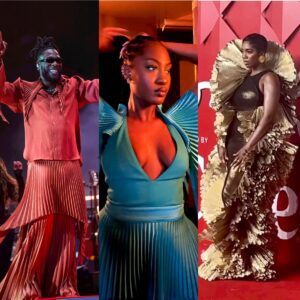
In the vibrant city of Lagos, Nigeria, 25-year-old Amara Nwosu was grappling with the pressures of modern life. A recent graduate in marketing, Amara had always enjoyed fashion but felt overwhelmed by the unrealistic beauty standards perpetuated by social media. Her wardrobe, once a source of joy, now felt like a battleground of insecurities.
Amara’s struggle with self-esteem was mirrored by her friend, Zuri Mbewe, who lived in Lusaka, Zambia. Zuri, a talented artist, had also found herself affected by the shifting trends and expectations of beauty. In Lusaka, fashion was celebrated, but the pressure to conform to certain ideals made Zuri question her self-worth.
Amara and Zuri’s experiences highlight a significant issue: the impact of fashion on mental health and self-esteem. As fashion evolves, it often sets new standards and trends that can either uplift or diminish one’s self-image.
In Lagos, Amara’s social media feed was filled with images of influencers flaunting their latest outfits, often marked by unattainable beauty standards. Despite knowing these images were often digitally altered, Amara couldn’t shake the feeling that she needed to look a certain way to be accepted. She began to equate her self-worth with her appearance, leading to anxiety and dissatisfaction.
One day, while browsing through a local market in Lagos, Amara met Ngozi Okafor, a fashion designer known for her inclusive and body-positive approach. Ngozi’s designs celebrated diversity, showcasing clothing that made people of all shapes and sizes feel beautiful. Amara was inspired by Ngozi’s philosophy and decided to collaborate on a project to promote body positivity and self-acceptance through fashion.
The collaboration brought Amara into contact with people from various backgrounds, each with their unique stories and experiences. She met Bisi Adewale, a young woman from the outskirts of Lagos who had struggled with body image issues but found solace in Ngozi’s designs. Bisi shared how wearing clothes that made her feel comfortable and confident transformed her outlook on life. She now worked as a community advocate, using her experience to help others embrace their individuality.
In Lusaka, Zuri’s artistic journey led her to meet Mwansa Chanda, a fashion blogger and activist who focused on promoting mental health awareness through fashion. Mwansa’s platform highlighted the importance of self-love and challenged traditional beauty standards. Zuri was captivated by Mwansa’s message and decided to contribute her own artwork to the blog, depicting the emotional and psychological effects of fashion trends.
Zuri’s artwork resonated with many readers, including Lindiwe Moyo, a university student in Lusaka who had struggled with self-esteem issues. Lindiwe shared how the pressure to conform to Western beauty standards had affected her mental health. She found relief in Mwansa’s blog and Zuri’s art, which encouraged her to embrace her natural beauty and reject unrealistic ideals.
As Amara and Zuri continued their respective journeys, they both began to understand that fashion could be a powerful tool for positive change. Amara’s project in Lagos gained traction, with local fashion shows and workshops focusing on body positivity and mental well-being. She saw firsthand how empowering people through fashion could boost their self-esteem and foster a supportive community.
Meanwhile, Zuri’s collaboration with Mwansa led to the creation of a series of art installations and social media campaigns that highlighted the importance of mental health in fashion. Their work sparked conversations in Lusaka about the need for more inclusive and realistic representations of beauty.
The impact of their efforts was evident in the stories of individuals they met along the way. In Lagos, Bisi’s advocacy work reached young people who had struggled with body image issues, providing them with resources and support. In Lusaka, Lindiwe’s newfound confidence inspired others to challenge conventional beauty standards and embrace their unique qualities.
Amara and Zuri’s experiences underscore the profound influence fashion can have on mental health and self-esteem. By challenging unrealistic beauty standards and promoting inclusivity, they demonstrated how fashion could be used as a tool for empowerment and positive change.
As Amara looked out over the bustling streets of Lagos, she felt a renewed sense of purpose. Her work with Ngozi had not only transformed her own perspective but also impacted the lives of many others. In Lusaka, Zuri’s art and advocacy continued to inspire change, encouraging people to embrace their individuality and prioritize their mental well-being.
The journey of Amara and Zuri highlights that while fashion can often perpetuate unrealistic standards, it also has the potential to foster self-acceptance and confidence. By embracing diversity and challenging conventional ideals, fashion can become a powerful force for good, helping individuals feel valued and empowered in their own skin.








